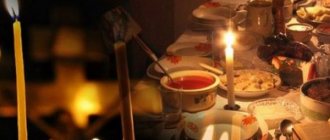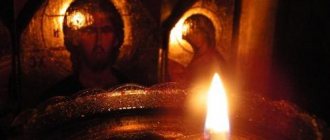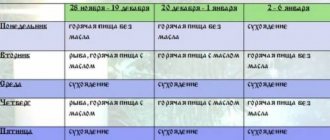A funeral service for a deceased person is a mandatory rite in the funeral practice of Orthodoxy. They are held on the day of the funeral, on the 9th and 40th days, and also on the anniversary of death. A wake is a sign of memory and respect for the deceased, an opportunity to sit at a memorial meal, indulge in memories of the deceased, and express condolences to relatives.
The wake is a day of remembrance and quiet sadness. Important days of remembrance and their meaning among the Orthodox
During a memorial ceremony, people often gather at the table and eat a meal, but the main goal is not to eat food, but to read prayers for the deceased. They say warm words about the deceased, and tell incidents from life associated with him. It is customary to speak well of the deceased, this is a tribute of respect, but at the same time it is a way of asking for the deceased when turning to the Lord. On this day it is not customary to laugh loudly; mourning etiquette should be observed.
The purpose of such a meal is to commemorate the deceased, which will provide him with an easier transition to the afterlife.
After the funeral, it is customary to organize a wake. You should pray for the soul of the deceased every day. But special attention is paid to certain dates. The third, ninth and fortieth days are counted. Each has its own meaning for the deceased:
- the first day until the third day: the soul is still attached to the earth and body, then its gradual separation occurs, the deceased is buried, when his disembodied shell appears before the Lord for worship, transition to the next step;
- until the ninth day: acquaintance with the lives of the saints of the heavenly monastery occurs, but the incorporeal shell does not remain here, but goes further; after the ninth day it finds itself in hell, where it looks from the side at the torment of the wicked;
- the fortieth day is the time when the soul must appear before the Lord, then its further fate is decided.
You can remember the deceased when it is convenient or the need arises, but one more day is special - 1 year after death. The funeral begins at the cemetery, but you cannot have a meal there; it is permissible to bring kutya. They continue at home, where a simple table of main dishes is served.
Day of Remembrance
Visit to the cemetery
After participating in a memorial service in church, Orthodox Christians usually visit the grave of the deceased. It is in keeping with Christian traditions to place an even number of fresh, rather than artificial, flowers on it. Real flowers symbolize the fact that God has everyone alive, and their even number represents the completion of earthly life.
Visiting the cemetery is overgrown with many superstitions that have no Christian basis:
- go to the cemetery exclusively in the first half of the day, supposedly to meet the souls of the dead, who are present there only at this time;
- do not enter the cemetery through the main gate through which the dead are transported: after all, they are also transported along the streets along which we never stop walking;
- fear of any objects from the cemetery: they are just objects;
- leaving food at the grave for the deceased: another thing is to address it to the poor with a request to pray for him;
- drink at the grave or pour vodka on it.
4 main fasts and one-day fasts in Christianity
One of the traditions of Orthodoxy is fasting on Wednesday and Friday (the day of betrayal and salvation of Jesus Christ). Moreover, its roots go far back to ancient times. For each of these days, special food is prepared. It is possible to eat oil and fish, but in a certain order. In addition, you should prepare a Lenten lunch for the funeral. Some food restrictions increase the alms that a person gives to the soul of the deceased through a funeral meal, giving a new meaning.
The Gospel mentions the “fast of hypocrites,” when those fasting take on a mournful expression on their faces and become gloomy, which is condemned by Christ, for such behavior is considered indicative - this indicates that they are observing fasting.
Food prepared during Lent may differ significantly from the traditional menu, but not for the worse:
- Lent (before Easter) - duration is 7 weeks, and in the 1st, 4th and 7th weeks the rule is observed - complete abstinence from fasting food, butter is allowed on Wednesdays and Fridays;
- Petrov: duration - 6-8 weeks, this fast is not so strict, on weekends and on religious holidays it is allowed to cook fish using different methods;
- Assumption - the shortest fast, it is recommended to give up inappropriate food for only 2 weeks in the second half of August;
- Christmas: lasts more than 1 month, begins in November, ends on January 6, it is allowed to eat fish on weekends and holidays, oil is excluded every 1, 3, 5 days of the week.
What to do and how to commemorate if the commemoration falls during Strict Lent
Lenten commemorations are the most preferable way to pay tribute to the deceased, since in this case the soul is not attached to food. A memorial meal is held to gather loved ones to pray for the deceased, to say kind words about him, but not for the purpose of satiation, but for the repose of the soul.
It is important to observe Orthodox traditions - remove fast food from the menu.
Unsuitable components should be replaced with plant foods, cereals, etc. Otherwise, there are no significant differences when holding a funeral.
Basic rules for holding a funeral for 1 year
First of all, you need to order services at the church (see below) for the repose. The presence and prayer of the relatives themselves is highly desirable. After all, the priest is only the performer of the ritual and cannot put into it the feelings and emotions experienced by people close to the deceased.
When ordering a memorial service, it is customary to bring food with you and leave it on a special table in the church - bread, cereals, sugar, pasta, sunflower oil or butter, cookies, candies, fruits. After the service and blessing, they are distributed to those in need.
The donation of flour to the church bakery for baking prosphoras and the church - candles, incense, and lamp oil are welcomed.
Those who come to the wake wear discreet clothes in dark colors. Maintaining annual mourning for the deceased is not considered mandatory; it is the personal choice of the relative.
A photograph of the deceased, tied with black mourning ribbon, is placed in a prominent place in the room where the funeral is held.
Foods that should not be consumed during fasting
Restrictions during fasting are a kind of sacrifice or asceticism, when a person voluntarily and briefly gives up his usual pleasures in order to gain new experiences, get closer to God, reconsider his views, etc. For this reason, it is better not to eat certain foods. Among them:
- meat (beef, pork, lamb, poultry);
- fish – selectively, with certain conditions;
- cheese, milk, and other dairy products;
- sauces, especially those containing animal fats;
- eggs;
- rich bread;
- sausages.
Ingredients for funeral dishes during Lent
What do you need?
The list of products is small:
- 0.5 kilograms of rice;
- 200 grams of dried apricots;
- three tbsp. l. honey;
- nuts (optional);
- 200 grams of raisins;
- 1 liters of water (for soaking).
How is the dish prepared? Soak the grains in water overnight or for several hours. This is necessary so that the porridge turns out crumbly. You need to cook until done. Towards the end, add honey diluted with water, as well as raisins and dried apricots. This is how kutya turns out.
Traditional meal at the funeral table
It is customary to organize a funeral dinner three times. This is a symbol of the transition of the soul from one world to another. You can also hold a wake during Lent, six months after death, on the first anniversary, on Angel's Day. Another way is a calendar commemoration, when this day falls on a major religious holiday. There are ritual dishes that are customary to prepare for such an occasion - when a loved one dies: pancakes, pies, kutia, jelly. It is much less common to remember the deceased with savory food: based on meat, animal fat (kulebyak, borscht, etc.).
When commemorations were held during Lent, it was believed that hot food must be present on the table, since the soul of the deceased flies away along with the steam.
General principles
Of course, the composition of the food will largely depend on the wealth of the family, the culinary traditions common in the area and on the number of people who are expected to come to the funeral. If you have the opportunity to cook everything at home with your family, you should offer those who come a simple lunch, without wasting time and effort on creating a complex menu and putting it into practice.
Funeral traditions also have their own obligatory dishes. This is, first of all, ritual kutia - porridge cooked from whole grains and flavored with honey and raisins. The funeral dinner itself should remain strict and simple, maintain mental and physical strength, and help maintain an atmosphere appropriate to the given moment. It is desirable that there be an even number of dishes, which must be consumed in a certain sequence.
Question-answer section
Is it possible to drink vodka at a funeral?
Expert opinion
Father Pavel
Clergyman
The Church does not approve of drinking alcohol. This harms the soul of the living and the deceased. There is no strict prohibition, so many today often include vodka in the funeral menu. It is recommended to abandon this custom in order to focus not on meals and other earthly pleasures, but on prayer for the deceased.
Is it possible to distribute candy at funeral services during Lent?
Expert opinion
Father Pavel
Clergyman
The tradition of distributing sweets and pies appeared a long time ago. This is a way to honor the memory of the deceased, to remember him. They distribute sweets not only to friends and colleagues, but also to passers-by on the street. They do not do this if nine days (9th day after death) fell on days of fasting; they postpone it to the weekend.
Is it possible to commemorate 40 days of fasting with your family at home and then distribute candy?
Expert opinion
Father Pavel
Clergyman
On the 3rd and 9th days after death, mostly the relatives of the deceased gather at the funeral table. However, on the fortieth day it is recommended to invite friends and colleagues of the deceased, since on this day the soul finally leaves the earth.
Are the deceased commemorated during Lent or can it be postponed?
Expert opinion
Father Pavel
Clergyman
Praying for the dead during Lent is permitted. The exception is cases when clergy give special recommendations - on Easter and other church holidays, funeral services are not held and are postponed to the next weekend.
Is it possible to have a funeral service in the first week of Lent, since it is the strictest?
Expert opinion
Father Pavel
Clergyman
Most clergy do not require parishioners to reschedule funerals if they fall during the first week of Lent. This is explained by the fact that the Orthodox canons do not regulate the holding of a funeral meal, so it is permissible to invite relatives and friends. But the dishes are prepared taking into account the rules of fasting.
Lenten menu for funerals 1 year, basic products?
Expert opinion
Father Pavel
Clergyman
Vegetables and cereals are used to prepare the funeral meal. Fish (depending on the type of fast), vegetable oil, and mushrooms may also be allowed. Various dishes are prepared from these products, but the table must include lean pancakes, kutia, uzvar or jelly, as well as pies.
Funeral on the first day of Lent, how to commemorate it in the Orthodox way?
Expert opinion
Father Pavel
Clergyman
There are no hard and fast rules regarding the rules of behavior during funerals when fasting has begun. However, you should submit a note to hold the liturgy when the next weekend arrives. It is not held on the day of Lent. The main condition for a wake is the sincere prayer of loved ones.
Lenten hot dishes
Classic Russian cabbage soup is served at the funeral table. They are prepared from fresh, as well as sauerkraut or sour cabbage (the latter options simplify the process). On fasting days, it is forbidden to cook first courses in meat broth; it is replaced with mushroom or vegetable broth. You can also prepare:
- borscht with beans;
- lentil soup;
- mushroom soup.
For the second one the following will be ideal:
- potatoes with mushrooms;
- mashed potatoes;
- cabbage rolls with rice, pearl barley;
- rice with vegetables;
- vegetable stew;
- pepper stuffed with rice.
Buckwheat recipe with prunes (10 servings). You will need 600 ml of buckwheat (3 cups), carrots and onions (3 pieces each), 300 g of prunes, salt, vegetable oil. The prunes need to be washed and poured with boiling water for 15 minutes. At this time, it is necessary to rinse the buckwheat under running water. Grate the carrots and chop the onion. Place the mixture of onions and carrots in a frying pan and fry. When the vegetable frying is ready, add prunes, cut into pieces. Pour buckwheat into the pan, add salt, pour 6 glasses of water, cover with a lid. Leave to simmer for 15-20 minutes.











